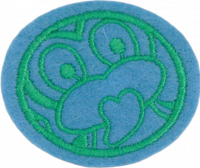Especialidades JA/Tradición maorí/Requisitos
1. Definir los siguientes términos de uso común:
- a. Marae
- b. Pōwhiri
- c. Karakia
- d. Ka Mate
- e. Waiata
- f. Korero
- g. Haka
- h. Kuia
- i. Tāne
- j. Wero
- k. Mana
- l. Manuhiri
- m. Hongi
- n. Hui
- o. Poroporoaki
- p. Whānau
- q. Tangi
- r. Aroha
- s. Whakairo
- t. Koro
- u. Kaumātua
- v. Wahine
- w. Mihi
- x. Whaikōrero
- y. Tangata whenua
z
- z. Taonga
2. Hacer lo siguiente:
- a. Dibujar o trazar un mapa del mundo y mostrar con flechas las direcciones del asentamiento Polinesio.
- b. ¿De dónde consideran los maoríes que llegaron a Nueva Zelanda?
- c. Explicar lo que es el gran mito de las migraciones. ¿Quién fue el autor de este mito? ¿Qué eran las canoas que llegaron en esta migración y de dónde vinieron?
- d. Dibujar o trazar un mapa de Nueva Zelanda que muestre todas las grandes zonas tribales y hacer la canoa para cada uno.
- e. ¿Por qué fue Rangitoto llamado «Rangitoto»?
3. Visitar o hacer una investigación de una «marae» con un grupo que ha sido llamado a un «hui». Escribir un informe sobre los acontecimientos que tomaron lugar desde el momento en que llegaron a la «marae» hasta la hora de irse. Indicar el nombre de la «marae», su localidad y la tribu a la que está afiliado.
4. Relatar brevemente las costumbres observadas en cada uno de los siguientes eventos:
- a. Mate
- b. Los horarios de comer
- c. Discursos
- d. Dormir
5. Explicar lo siguiente:
- a.
What are the two Māori religions currently in use today, and what are some of their characteristics?
- b.
Briefly describe the Māori story of creation.
- c.
Briefly outline the story of Seventh-day Adventism among the Māori people.
- d.
What is the Māori attitude to religion in general?
6.
Make a sample tukutuku panel (approx 30 cm x 30 cm) OR a tipare OR a small flax mat/basket.
7.
Know how to correctly:
- a.
Greet people in Māori
- b.
Hongi
8.
Demonstrate the following:
- a.
What are five different pastimes enjoyed by Māori children in former times?
- b.
Learn how to do three string figures and walk on stilts.
9.
Do one of the following:
- a.
If possible, visit an old pā site and make a brief written report on what you could see.
- b.
Research briefly the history and architecture of New Zealand’s native people (Māori) pā sites. Then, visit ruins or a reenactment site of native peoples in your region or a region you are visiting. Report on your experience.
- c.
Research New Zealand (Māori) pā sites as well as native peoples villages and/or fortresses that were built in your locality. Write, draw, illustrate, create models, or explain what a pā was, and how it compares and contrasts with the sites built by native historic peoples in your region.


